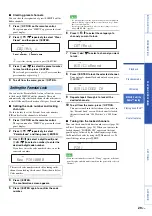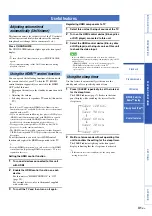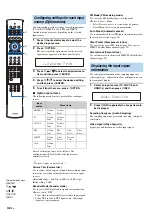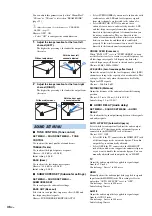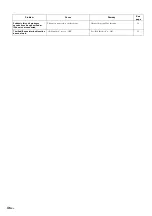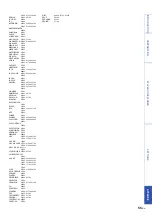
43
En
PREP
ARA
TION
IN
T
R
ODU
C
TI
ON
AP
PEN
DI
X
PLA
Y
B
A
CK FEA
T
URES
S
E
TT
INGS
Customizing this unit
(SET MENU)
System
configurations
(ADVANCED SETUP)
Using an external
amplifier
Controlling external
components
APPENDIX
Refer to the chart below when this unit does not function properly. If the problem you are experiencing is not listed below
or if the instruction below does not help, set this unit to the standby mode, disconnect the AC power supply cable, and
contact the nearest authorized Yamaha dealer or service center.
■
General
Troubleshooting
Problem
Cause
Remedy
See
page
This unit does not operate
properly.
The internal microcomputer has been frozen
by an external electric shock (such as
lightning or excessive static electricity) or
by a power supply with low voltage.
Disconnect the AC power supply cable from
the outlet and plug it in again after about 30
seconds.
This unit fails to turn on
when
C
Power (
p
)
key is
pressed, or enters the
standby mode soon after the
power has been turned on.
The AC power supply cable is not firmly
connected to the AC wall outlet.
Connect the AC power supply cable firmly
to the AC wall outlet.
This unit has been exposed to a strong
external electric shock (such as lightning
and strong static electricity).
Set this unit to the standby mode, disconnect
the AC power supply cable, plug it back in
after 30 seconds, and use it normally.
This unit suddenly enters
the standby mode.
The internal temperature becomes too high
and the overheat protection circuitry has
been activated.
Wait for about one hour for this unit to cool
down and turn it back on.
—
The sleep timer has turned the unit off.
Turn on the power and play back the source
again.
No sound.
Incorrect input or output cable connections.
Connect the cables properly. If the problem
persists, the cables may be defective.
No appropriate input source has been
selected.
Select an appropriate input source with
INPUT or
D
Input selector keys.
The volume is turned down.
Turn up the volume.
The sound is muted.
Press
K
MUTE or
K
/– to
resume audio output and adjust the volume
level.
The signals this unit cannot reproduce (such
as PCM signals with more than 96 kHz of
sampling frequency) are being received
from the source component.
Play a source whose signals can be
reproduced by this unit.
—
Change the system settings of the source
component.
—
The HDMI components connected to this
unit do not support the HDCP copy
protection standards.
Connect the HDMI components that support
the HDCP copy protection standards.
“SUPPORT AUDIO” is set to “OTHER”
and HDMI audio signals are not being
played back on this unit.
Set “SUPPORT AUDIO” to this unit in
“SET MENU”.
No sound or too small
sound from a specific
channel
The output level of the channel is muted.
Raise the output level of the channel.
The beam setting is inappropriate.
Adjust the beam setting.
You play back the source in the stereo mode.
Start surround playback.
Some audio output methods do not output
sound beams for certain channels.
Select another beam mode.
No sound from the
subwoofer.
“BASS OUT” is set to “FRONT OR
AUTO” in “SUBWOOFER SET”.
Set “BASS OUT” to “SUBWOOFER” in
“SUBWOOFER SET”.
The source does not contain low bass signals.
No sound from the
subwoofer connected by
wireless.
The group IDs of this unit and SWK-W10
are not set to the same value.
Check whether the group IDs of this unit
and SWK-W10 are set to the same value.
“Wireless Function” is set to “No”.
Set “Wireless Function” to “Yes”.
Distorted or too little bass
sound.
“CROSS OVER” is set incorrectly in
“SUBWOOFER SET”.
Set “CROSS OVER” correctly in
“SUBWOOFER SET”.

